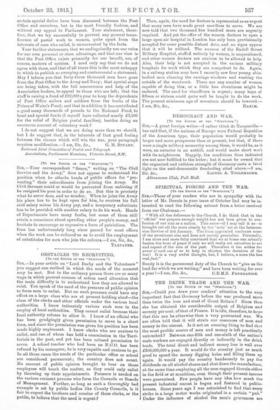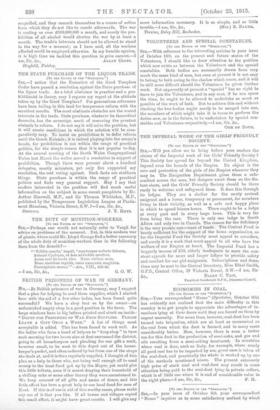THE DRINK TRADE AND THE WAR.
[To THE EDITOR OF Tilt "SPECTATOR."' Sins—Could you draw your readers' attention to the very important fact that Germany before the war produced more than twice the iron and steel of Great Britain P Since then she has obtained the considerable output of Belgium and seventy per cent. of that of France. It is idle, therefore, to hope that this can be otherwise than a very protracted war. We are often told that it will strain our resources of men and money to the utmost. Is it not an amazing thing to find that the most prolific source of men and money is left practically untouched P Between one-fifth and one-sixth of the nation's male workers are engaged directly or indirectly in the drink trade. The total direct and indirect money loss is well over £200,000,000 a year. It would do the country just as much good to spend the money digging holes and filling them up again. It would pay the country handsomely to pay the dividends on all alcohol shares and shut down the manufacture, at the same time employing all the men engaged therein either in the field or at munitions, even though their present income were guaranteed. Few people have any idea how much the present industrial unrest is begun and fostered in public. houses. Some years ago I was astonished to find that every strike in a large motor works originated in a certain "pub." Under the influence of alcohol the men's grievances aro
magnified, and they commit themselves to a course of action from which they do not like to recede afterwards. The war is costing us over £100,000,000 a month, and surely the pro- hibition of all alcohol would shorten the war by at least a month. The trade's interests should not be allowed to stand in the way for a moment ; as I have said, all the workers affected could be employed otherwise. In my humble opinion, it is high time we tackled this question in grim earnest.—I







































 Previous page
Previous page